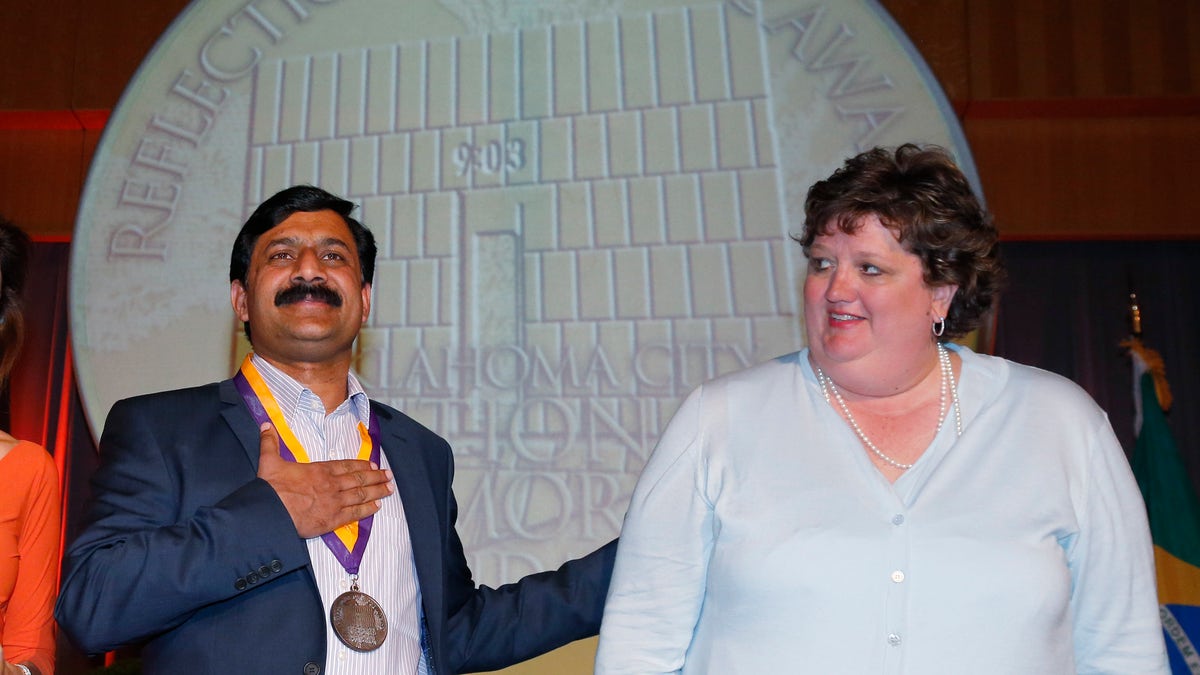
Ziauddin Yousafzai, left, reacts after receiving the Reflections of Hope Award from Kari Watkins, right, executive director of the Oklahoma City National Memorial & Museum, in Oklahoma City, Monday, May 13, 2013. The 2013 Reflections of Hope Award was presented to Yousafzai and his daughter Malala Yousafzai, who was not present. Malala was shot in the head by a Taliban gunman in an assassination attempt that drew attention worldwide to the struggle for women's rights in her homeland. (AP Photo/Sue Ogrocki) (The Associated Press)
OKLAHOMA CITY – A Pakistani human rights activist who founded an all-girls school said the Taliban was "more afraid of the books than bombs" as he and his 15-year-old daughter, who survived an assassination attempt by the Taliban late last year, were honored Monday at the memorial for Oklahoma City bombing victims.
Ziauddin Yousafzai decried political violence during a ceremony held to honor him and his daughter, Malala Yousafzai, who has been recovering in Great Britain since the shooting that garnered international attention. The annual Reflections of Hope Award is given out by the Oklahoma City National Memorial & Museums in honor of the 168 people who died in the 1995 bombing of the Oklahoma City federal building.
The elder Yousafzai said Pakistani citizens are all too familiar with the kind of political extremism that led to the Oklahoma attack, as well as the Sept. 11 terrorist attacks and the Boston Marathon bombings last month.
"We share the pain. We share the suffering," he said. "We have tragedies like Boston every day."
He denounced the violence inflicted by Taliban insurgents that has taken the lives of tens of thousands of civilians and soldiers over the past 30 years. He said the Islamic fundamentalists advocate an "ideology of darkness" where truth is stifled and education is discouraged.
"My part of the world is bleeding. I'm here to bring my people out of terrorism," he said.
The award began in 2005, and past recipients include the Rev. Alex Reid of Dublin, Ireland, for his life's work in the peace process in Northern Ireland, and Durga Ghimire, who co-founded a community-based organization dedicated to improving the lives of marginalized people in Nepal. President Bill Clinton, who was president when the Oklahoma City bombing occurred, also has been honored.
Yousafzai accepted the award on his daughter's behalf during his first trip to the United States since the Taliban's assassination attempt on Malala. In a recorded acceptance speech, she said the Oklahoma memorial's recognition served as encouragement to continue being an advocate for the right of girls worldwide to receive an education.
"It's more courage. It's more strength," said Malala, who returned to school in England in March.
Yousafzai founded the all-girls Khushal Public School 17 years ago to foster female leadership in an area where the Taliban has banned girls from attending school. His daughter also was an activist who attended the school until Oct. 9, when the Taliban shot her in the head and neck while she was riding the school bus home. The Taliban said it targeted her because she promoted girls' education and "Western thinking."
Prior to the shooting, Malala spoke out about having the right to speak and to an education. In a video clip played during the ceremony, she said: "I want every girl, every child, to be educated."
The shooting sparked outrage in Pakistan and other countries, and Malala's story captured global attention for the struggle for women's rights in her homeland. Malala was airlifted to Britain from Pakistan to receive specialized medical care and protection against further Taliban threats. She had surgery to reconstruct her skull in February.
Ziauddin Yousafzai said he was honored to be known largely as Malala's father in Pakistan's male-oriented society and dedicated the award to fathers, brothers, sons and husbands "who believe and who accept and who respect their daughters, their sisters, their mothers and their wives."
"They are individuals and they are equal to them," he said.
As he concluded, dozens of teenage girls from nearly three dozen Oklahoma communities entered the stage behind him holding signs that read: "I am Malala." He encouraged them: "We should defeat bad ideas with good ideas."

